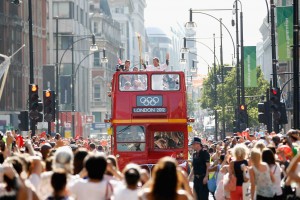Olympian Economics (Ep. 85)
[omny:https://traffic.omny.fm/d/clips/aaea4e69-af51-495e-afc9-a9760146922b/14a43378-edb2-49be-8511-ab0d000a7030/670387b2-b916-4d8e-b196-ab0d001b4a5e/audio.mp3]

A torch bearer carrries the Olympic Torch on a London Bus through Central London on July 26, 2012 in London, England. (Photo by Tom Shaw/Getty Images)
Our latest Freakonomics Radio on Marketplace podcast is called “Olympian Economics,” with Tess Vigeland sitting in for Kai Ryssdal this week.
(You can download/subscribe at iTunes, get the RSS feed, listen via the media player above, or read the transcript.)
With the 2012 Summer Olympic Games getting underway this week in London, we ask a simple question: do host cities really get the benefits their boosters promise, or are they just engaging in some fiscal gymnastics?
If you’ve read what we’ve posted in the past about the Olympics, you may already have a glimmer of a hint of a possibility of the answer to that question.
In the podcast, you’ll hear from the University of Chicago economist Allen Sanderson, who has looked at how the economic impact of big events like political conventions and NATO summits are often exaggerated. Sanderson worked with student Samantha Edds on the paper “Economic Impacts of the Olympic Games Through State Comparison.” As Edds writes:
To assess the economic impact of hosting the Olympics, the host state/region will be compared to a same-country state/region that did not host the Games through the examination of infrastructure, prestige and general financial growth models over a nine-year period. Apart from one section—construction—from the 1992 Barcelona Games, all models appear to show that host states/regions do not have significantly different changes in growth compared to the control states/regions.
You’ll also hear from noted sports economist Andrew Zimbalist of Smith College who has long tried to answer question at the intersection of sports and business.
As we discuss, cities that bid for the Olympics have at the very least two audiences: the International Olympic Committee, which want to be impressed with grandiose plans; and the local business community, which wants to be impressed with how cost-effective the Olympics will be.
One element we didn’t discuss in the piece, but which has become obvious over time, is that the costs of security have skyrocketed in recent decades, and sometimes balloon in the very last days of preparation. That is the classic type of large expense that bid committees can very easily underestimate when they are putting together a budget 10 years before the Games.

Comments